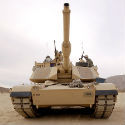The Pentagon is planning to increase its work within the world's leading 5G standards organization. Some analysts aren't surprised, but warn that the military may need to move carefully.

The US Department of Defense (DoD) said it plans to expand its activities in standards-setting organizations including the 3GPP, which is the primary global technology-development association for 5G.
"To promote high-quality, protected and reliable 5G devices and applications, the US must play a lead role in shaping information and communications technology standards," the Pentagon wrote in its new "5G strategy implementation plan," issued in December. "DoD will fully implement its Standards Engagement Plan and will actively participate in the 3rd Generation Partnership Project (3GPP) organization."
The agency said its subject matter experts will work with peers at other US agencies like the Federal Communication Commission (FCC), the National Institute of Standards and Technology (NIST) and the National Telecommunications and Information Administration (NTIA) in order to interact with standards-setting bodies including the 3GPP, the Alliance for Telecommunications Industry Solutions (ATIS) and the Institute for Electrical & Electronics Engineers (IEEE).
The goals, according to the US military, include "strengthening US influence in key standards setting organizations and promoting high-quality American 5G and beyond technologies."
5G goes to war
That's not a surprise in light of the DoD's increasing focus on 5G. Already the agency has issued $600 million in contracts for 5G operations in bases across the US. And the DoD said a second set of contracts should be issued in the coming months.
Such efforts come as US military officials make some initial moves toward building a unified, comprehensive, interoperable wireless networking system based on 5G technology that would basically connect everything owned and operated by the Pentagon.
The US military's increasing interest in 5G doesn't come as much of a surprise, according to a number of analysts who follow the 3GPP's activities.
"I view the military as another vertical market, just like the automobile industry, factory automation, oil and gas, etc.," wrote analyst Mike Thelander of Signals Research Group in response to questions from Light Reading. "If they have ideas which furthers the advancement of 5G and makes the technology suitable for new market opportunities then it is OK."
In fact, according to 3GPP spokesperson Kevin Flynn, the DoD is already a member of the 3GPP, along with other US government agencies including the FCC, NTIA, NIST and the US Department of Transportation. In response to questions from Light Reading, Flynn counted more than 30 "other government bodies" among the 3GPP's global membership.
Wireless consulting engineer Steve Crowley added that the DoD is in "a role more of monitoring certain meetings than trying to influence work."
However, he said the DoD's new "5G strategy implementation plan" would ramp up those efforts significantly. This, he said, is good. "Standards are improved as their development is informed by stakeholders. If DoD's plan is implemented, it becomes a stakeholder in two ways – as a 5G developer and user," he wrote in response to questions from Light Reading.
And Prakash Sangam of Tantra Analyst added that the DoD can aid in the development of the 5G standard by issuing usage requirements as well as contributing technologies from its research and development efforts and, potentially, by helping to drive the standard itself.
Obstacles and options
"This could be problematic, depending on how they execute," Sangam wrote in response to questions from Light Reading. "If they do this through US companies and other non-government and non-political entities, there might be less friction. However, if they try to drive it by themselves, there might be lots of issues. 3GPP is primarily a commercial and consensus global organization. Injecting political and/or regional issues into it would affect 3GPP's effectiveness."
Sangam added: "This would politicize the process, develop regional groups and slow down development and affect 3GPP's fabric, and move it away from consensus based, commercial focus."
Thelander argued though that there are plenty of options for the DoD beyond the 3GPP, if its desires exceed the association's mandate. "If the military wanted something that required wholesale changes to the standard and/or its evolution which were unacceptable to other members they would hit an insurmountable road block," he explained. "At that point they would need to ... take their toys and play somewhere else."
Thelander said the DoD could either join or form an association like the O-RAN Alliance to collect likeminded stakeholders like suppliers and technology vendors. "They could control who is and isn't a member and they could define/implement their requirements," he explained. "Obviously, their work would have to be supported by 5G so they could be somewhat limited in what they do, but if they had some modest success within 3GPP they could get some of the hooks they need built into the standard so they could then go off and modify as they see fit."
Related posts:
— Mike Dano, Editorial Director, 5G & Mobile Strategies, Light Reading | @mikeddano
About the Author(s)
You May Also Like











